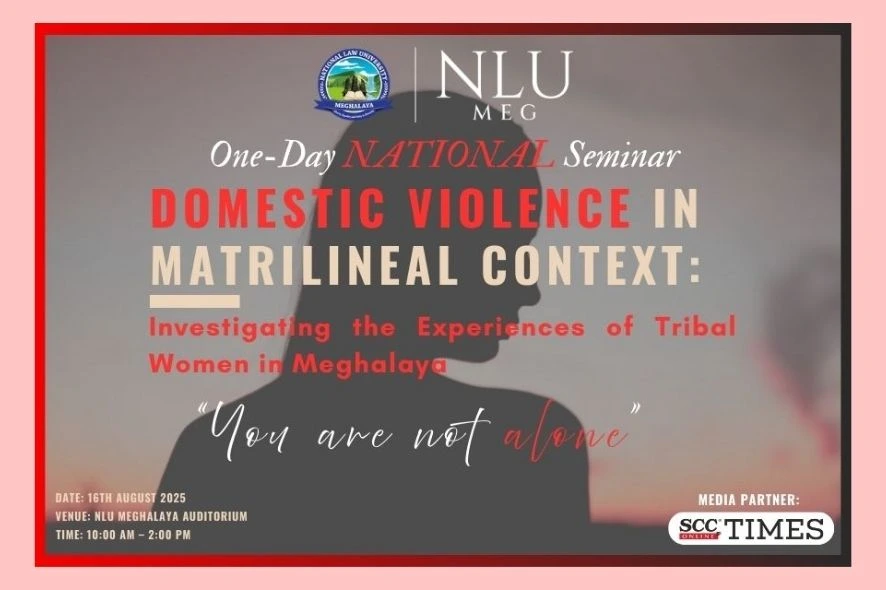On 16-08-2025, a One-Day National Seminar on Domestic Violence in the Matrilineal Context was organised by the Legal Aid Society of NLU Meghalaya in collaboration with SCC Times as the official media partner. The Seminar brought together eminent academicians, practitioners, and students from across the country to reflect upon how domestic violence manifested in matrilineal communities. Over the course of the day, participants engaged in thought-provoking discussions on socio-legal frameworks, relevant statutory provisions, and the cultural dimensions that shaped women’s experiences in Meghalaya.
Registration and Arrival of Participants
The morning began with an energetic atmosphere as the registration desk opened at NLU Meghalaya. Students, delegates, and faculty members made their way into the venue, signing in at the desk and receiving seminar materials. Banners and displays highlighting the theme of Domestic Violence in the Matrilineal Context set the tone for the day. Informal conversations among early arrivals reflected both curiosity and anticipation for the wide-ranging discussions ahead.
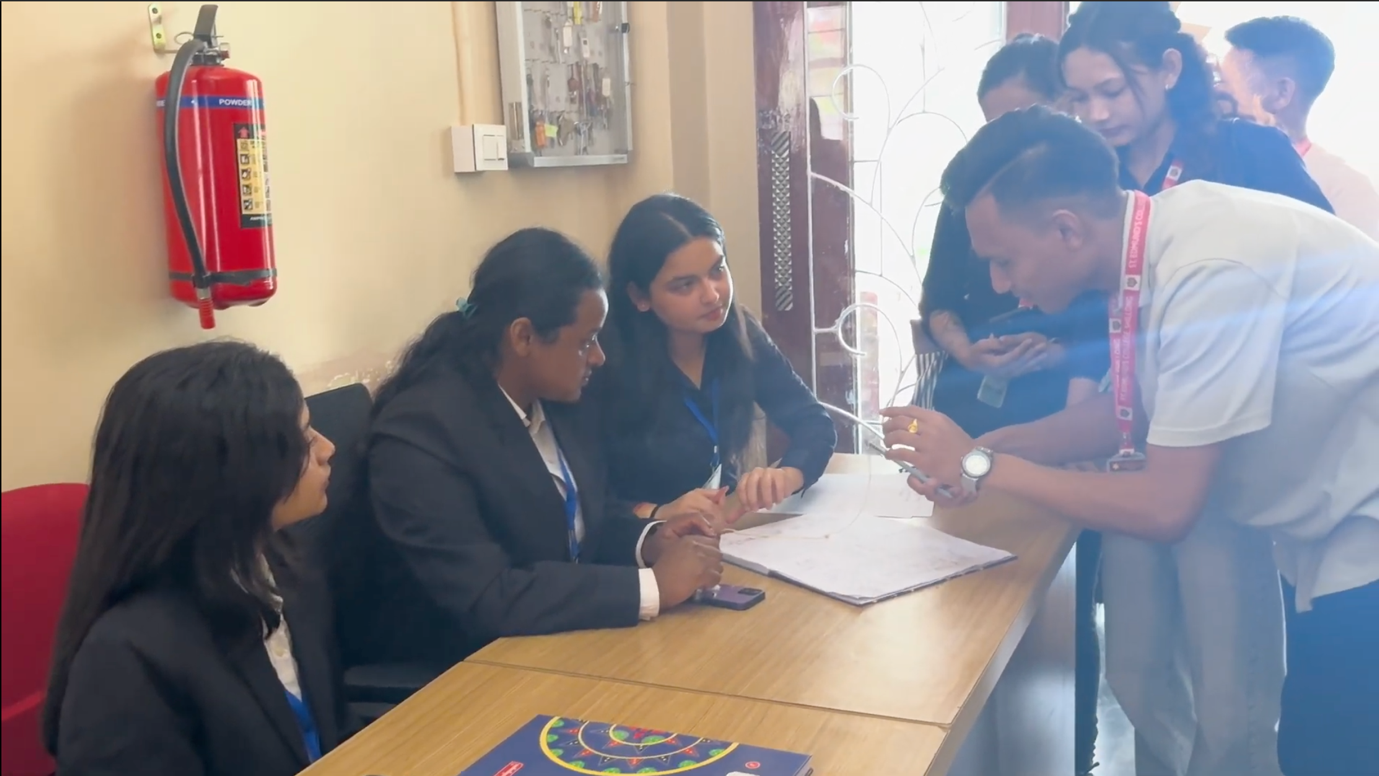
Distinguished guests were warmly welcomed by the organising committee. The panel included:
-
Smti. Iamonlang M. Syiem, Chairperson, Meghalaya State Commission for Women
-
Dr. Surja Kanta Baladhikari, Assistant Professor, NUJS Kolkata
-
Dr. Ankita Chakraborty, Assistant Professor, St. Xavier’s University
-
Smti. Olivia A. I. Bang, Advocate, Supreme Court of India
Opening of the Seminar
The proceedings of the seminar were set into motion by anchors, who warmly welcomed participants and guests. In their opening words, they emphasized the critical importance of the theme, understanding domestic violence within the matrilineal framework of Meghalaya. Their introduction highlighted how this dialogue was not only rooted in legal discourse but also in cultural awareness and social responsibility. By framing the seminar as a space for reflection and action, the anchors established an engaging and thoughtful tone for the day ahead.
Skit on Domestic Violence
The NLU Meghalaya Students’ Theatre Club captivated the audience with a skit that dramatised the realities of domestic violence within a matrilineal household. More than a performance, the act served as an educational tool illustrating the legal rights available to women and the avenues of support they could access when facing violence or abuse. With impactful storytelling, the students highlighted how awareness of rights under laws such as the Protection of Women from Domestic Violence Act, 2005, was crucial for empowerment. The performance resonated deeply with participants, reminding all present that art and advocacy together could drive powerful social change.
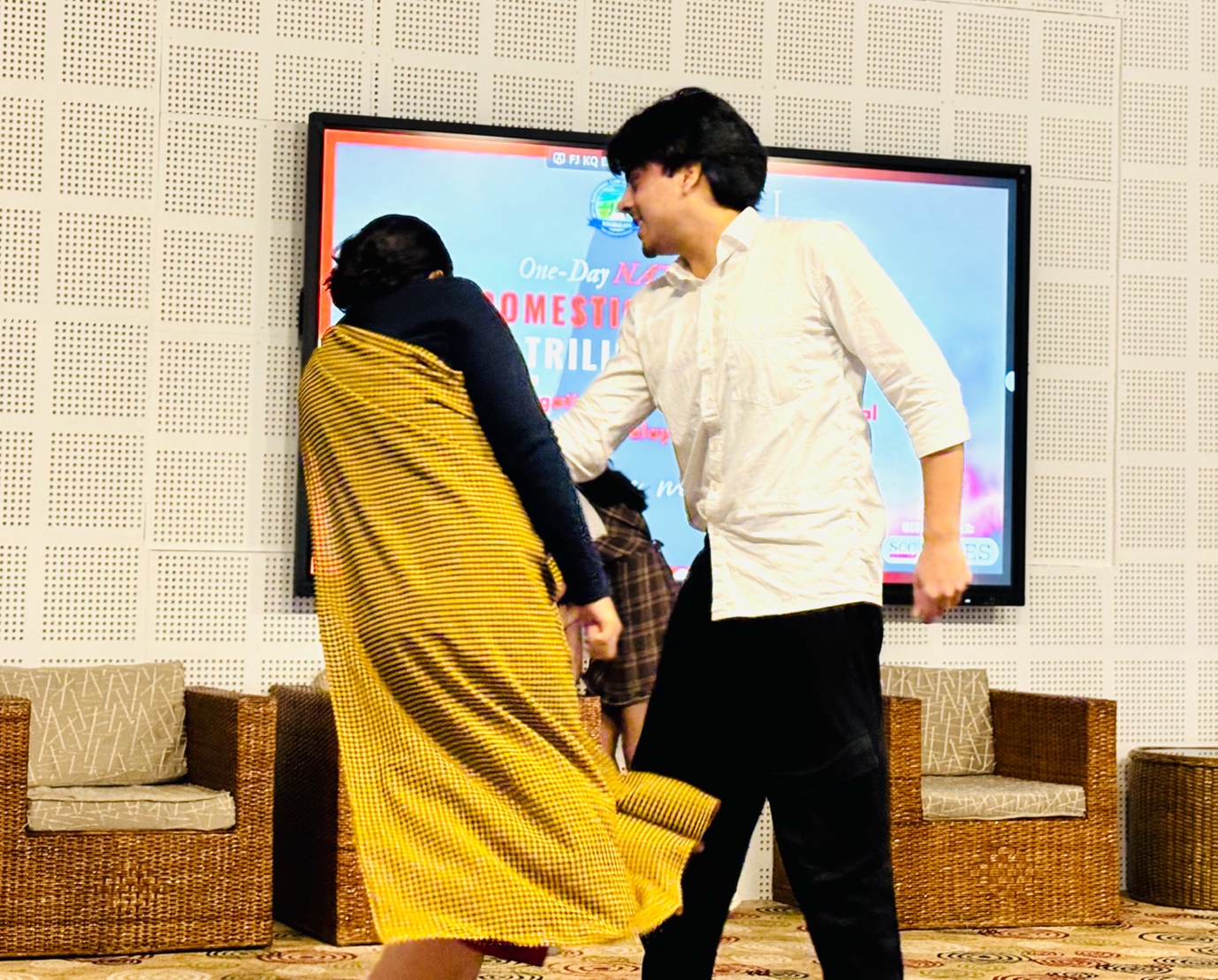
The skit concluded to resounding applause, as the message struck a deep chord with the audience. The performance left behind not only an emotional impact but also a powerful social reminder, setting the tone for the serious deliberations to follow. The strong message conveyed through the act reinforced the urgency of understanding and addressing domestic violence within Meghalaya’s matrilineal framework.
Felicitation and Symbolic Planting
The seminar proceeded with a gesture of honour and appreciation as distinguished guests were felicitated by the organisers. The ceremony reflected the seminar’s commitment to acknowledging the support and presence of eminent scholars, while reinforcing the collaborative spirit of the gathering.
Immediately following the felicitation, the seminar observed a meaningful gesture as the chief guests participated in the watering of plants. This symbolic act represented growth, nurturing, and sustainability, aligning with the seminar’s broader message of fostering justice, awareness, and societal reform. The ceremony was received warmly by the audience, adding a reflective and symbolic dimension to the day’s proceedings.
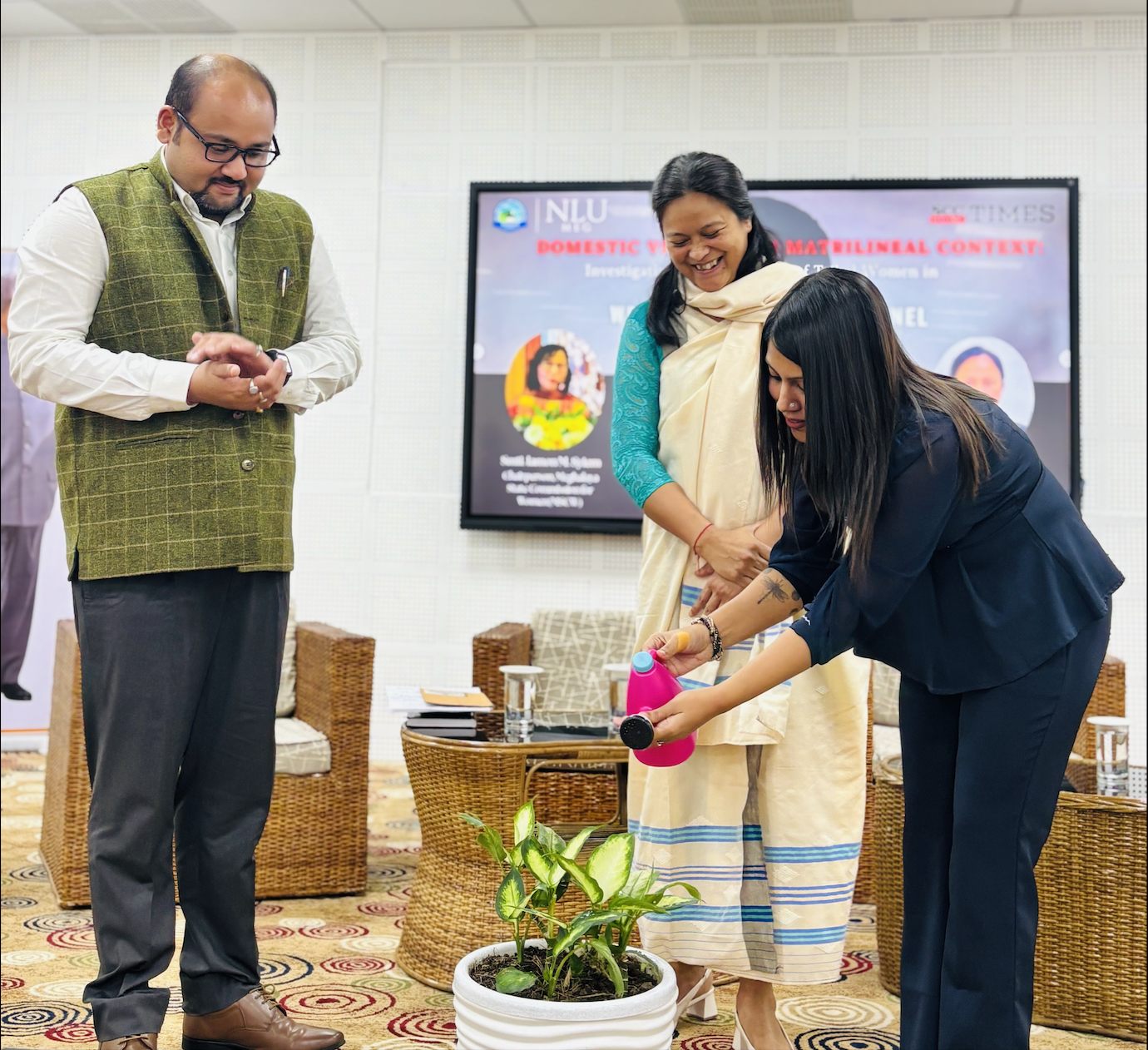
Welcome Address
The formal proceedings of the seminar began with the Welcome Address delivered virtually by Dr. Umeshwari Dkhar, Assistant Professor and coordinator of the Legal Aid Society at NLU Meghalaya. In her address, she warmly greeted the dignitaries, faculty, students, and participants from across institutions, setting the academic tone for the day. She emphasised the importance of situating the issue of domestic violence within Meghalaya’s matrilineal framework, noting that such discussions were vital for developing context-sensitive legal and social responses. Though speaking virtually, her presence was strongly felt, as she extended gratitude to the organizers, collaborators, and media partners for making the seminar possible.
A special welcome was extended to Dr. Ankita Chakraborty, recognizing not only her academic contributions but also her remarkable research on women’s rights and her impactful ground-level work in the field. Her dedication to bridging scholarship with social advocacy was highlighted, underscoring her role as a voice of both intellectual depth and practical engagement.
Research Insights from Dr. Ankita Chakraborty
In her in-depth address, Dr. Ankita Chakraborty presented the findings of her extensive study on domestic violence in Meghalaya, drawing from fieldwork across four districts: East Khasi Hills, Jaintia Hills, Ri-Bhoi, and West Khasi Hills, where the highest number of reported domestic violence cases were recorded.
She explained economic violence, noting real-life examples where men exploited financial systems to control women. For instance, many taxi drivers opened accounts in their wives’ names, but when women were denied access to those accounts, or when husbands seized revenues from women-run businesses, it became a clear form of economic violence. She reminded the audience that the Protection of Women from Domestic Violence Act, 2005 (PWDVA), explicitly recognised such economic deprivation and provided for victim-centric, survival-focused civil reliefs, including urgent ex parte orders.
Her study included the analysis of 87 trial court case files and interviews with 160 stakeholders, such as survivors, magistrates, police officers, protection officers, women’s commission members, and community leaders. Using focus group discussions, doctrinal and ethnographic methods, and triangulation, she painted a vivid picture of how domestic violence cases played out on the ground.
She emphasized that matriliny did not equal immunity. Despite inheritance passing through the mother’s line, decision-making remained male-centric, compounded by a lingering colonial hangover in governance structures. Community authorities like Dorbar Shnongs and Seng Kynthei played crucial roles, but their male-dominated structures often sidelined women’s voices.
Survivors, she observed, tended to prioritise residence and security orders over criminal punishment, reflecting cultural preferences to avoid court battles against husbands. This preference aligned with the civil, non-criminal design of the PWDVA, but she warned of a troubling under-utilisation gap: courts often emphasised maintenance orders without attaching sufficient safety measures, leaving women vulnerable.
She also critiqued how non-physical violence (emotional, psychological, or economic) was often dismissed at the trial level, with magistrates reluctant to engage fully. At the same time, protection officers remained under-resourced, weakening the law’s implementation.
Community-based dispute resolution, she noted, was a double-edged sword: while local forums could deter immediate harm through warnings and community pressure, they sometimes pulled survivors away from formal legal remedies, reinforcing silence and under-reporting. Cultural norms around privacy and stigma often discouraged women from seeking justice. Survivors felt that “the moment they went to court, their homes were being painted red.”
Her concluding recommendations stressed the need for a hybrid model that integrated formal legal mechanisms with community-based approaches. She applauded the student skit performed earlier, noting how it captured the lived reality of women who avoided courts for fear of breaking families, instead relying on community support. To truly address domestic violence, she argued, both courts and community structures had to be strengthened in tandem, ensuring survivors had safe, accessible, and trusted pathways to justice.
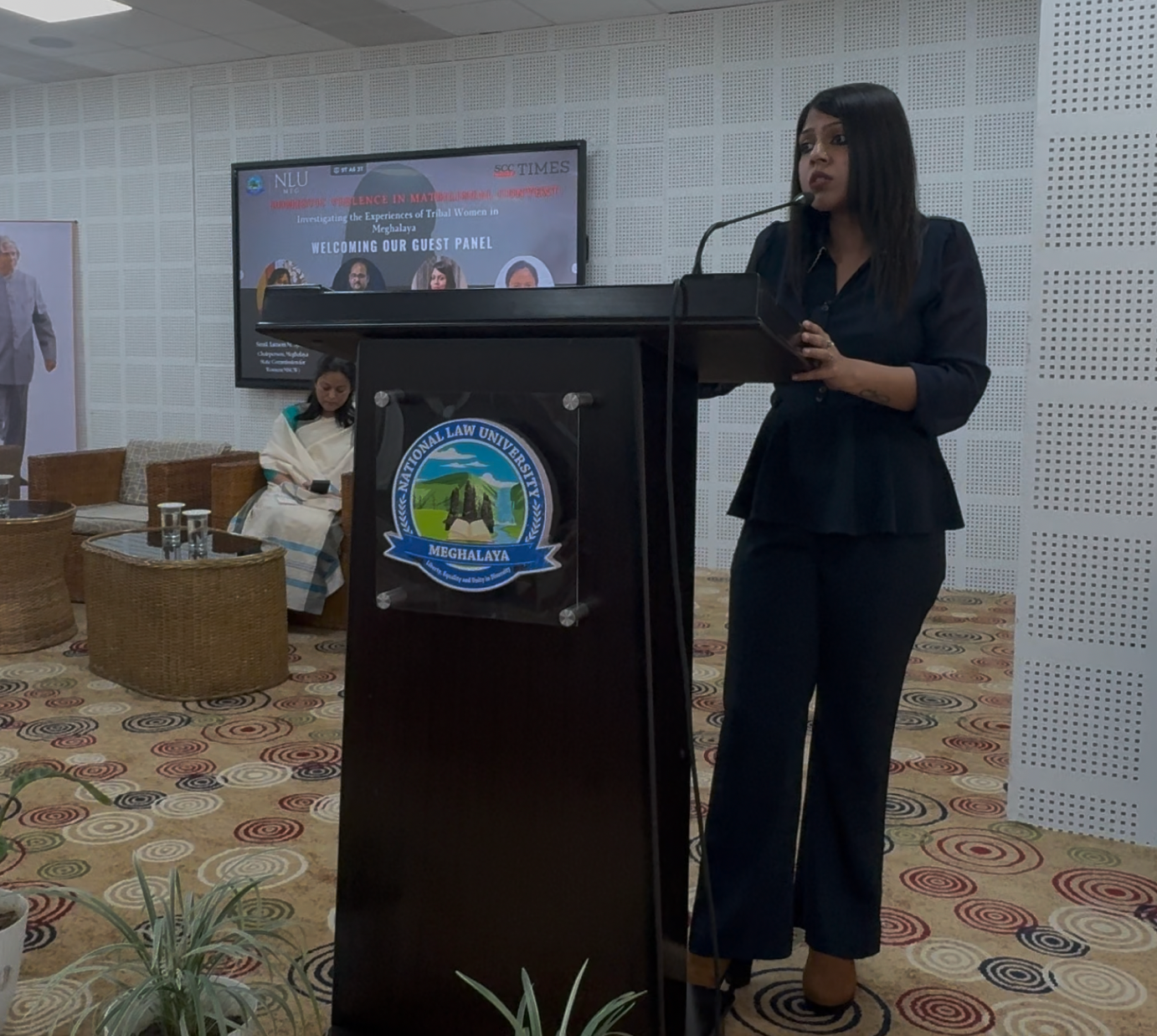
Legal Frameworks by Dr. Surja Kanta Baladhikari
Dr. Surja Kanta from NUJS engaged the audience in an insightful interactive session, drawing connections between the earlier theatrical performance and the legal realities of domestic violence protection. Referencing the powerful skit by NLU Meghalaya students, he emphasised how the performance effectively demonstrated that domestic violence “could not be the practice of lineage” in matrilineal societies.
He clarified that the PWDVA provided civil remedies and not criminal remedies and explained how the Act’s preamble focused on protecting women’s rights guaranteed under the Indian Constitution, specifically referencing Articles 14, 15, 16, 21, and 39(a). He highlighted the Act’s progressive approach to shared housing concepts, noting that it could not be claimed that the house belonged to the husband alone.
He also addressed the broader criminal justice crisis, presenting alarming statistics: “3.43 crore criminal cases pending in India,” which had increased to “3.65 crore” within a year, comprising “65% of the total bank” of pending cases. He questioned whether imprisonment alone could provide the relief envisaged under PWDVA Sections 15-20, particularly residence orders, protection orders, monetary relief, and custody arrangements.
When discussing Meghalaya specifically, he revealed troubling NCRB data: “Meghalaya reported 0 cases” of domestic violence in 2019, 2021, and 2022, raising the critical research question of whether there were truly no cases or simply no cases reported. His research findings from 87 trial court cases showed that 92% of perpetrators were husbands, with the 40 age group being most affected, and incidents occurring more frequently among daily wage labourers with dependent minors.

Smti. Olivia Bang on the Dimensions of Domestic Violence
Smti. Olivia Bang led an engaging and interactive discussion with the students, emphasizing the multifaceted nature of domestic violence beyond just physical abuse. She highlighted that the Domestic Violence Act covered not only formal marital relationships but also intimate partner violence and informal relationships.
She educated the audience on key aspects of the Act, pointing out that violence could be physical, emotional, mental, economic, or financial. She stressed that anyone experiencing emotional violence, even without physical harm, had the right to report it and receive protection. Acknowledging the gender sensitivity of the law, she also noted that men could report domestic violence.
Touching on sensitive topics like marital rape, she informed the audience that while it was recognized under PWDVA, its criminal punishment remained a complex, evolving legal issue. She also introduced the plight of “abandoned brides”, women married to Indian citizens abroad who became victims of domestic violence without legal recourse due to jurisdictional hurdles.
On custody issues, she explained that custody was usually contested by women or men, often defaulting to mothers until children turned 18. She critically examined the role of One Stop Centers and mediation, raising concerns about their effectiveness, especially where physical abuse was involved.
Her discussion underscored the challenges of enforcement, including reluctance to admit electronic evidence in some courts and insufficient support from legal aid advocates due to heavy caseloads. She highlighted the delays in investigations and inadequacy of victim compensation, noting the harsh reality for many survivors in matrilineal contexts who forewent claims.
Concluding with a call to recognize the gap between the law’s provisions and ground realities, Olivia motivated students to think critically about their roles in addressing domestic violence, encouraging counselling, support systems, and awareness to break the cycle.
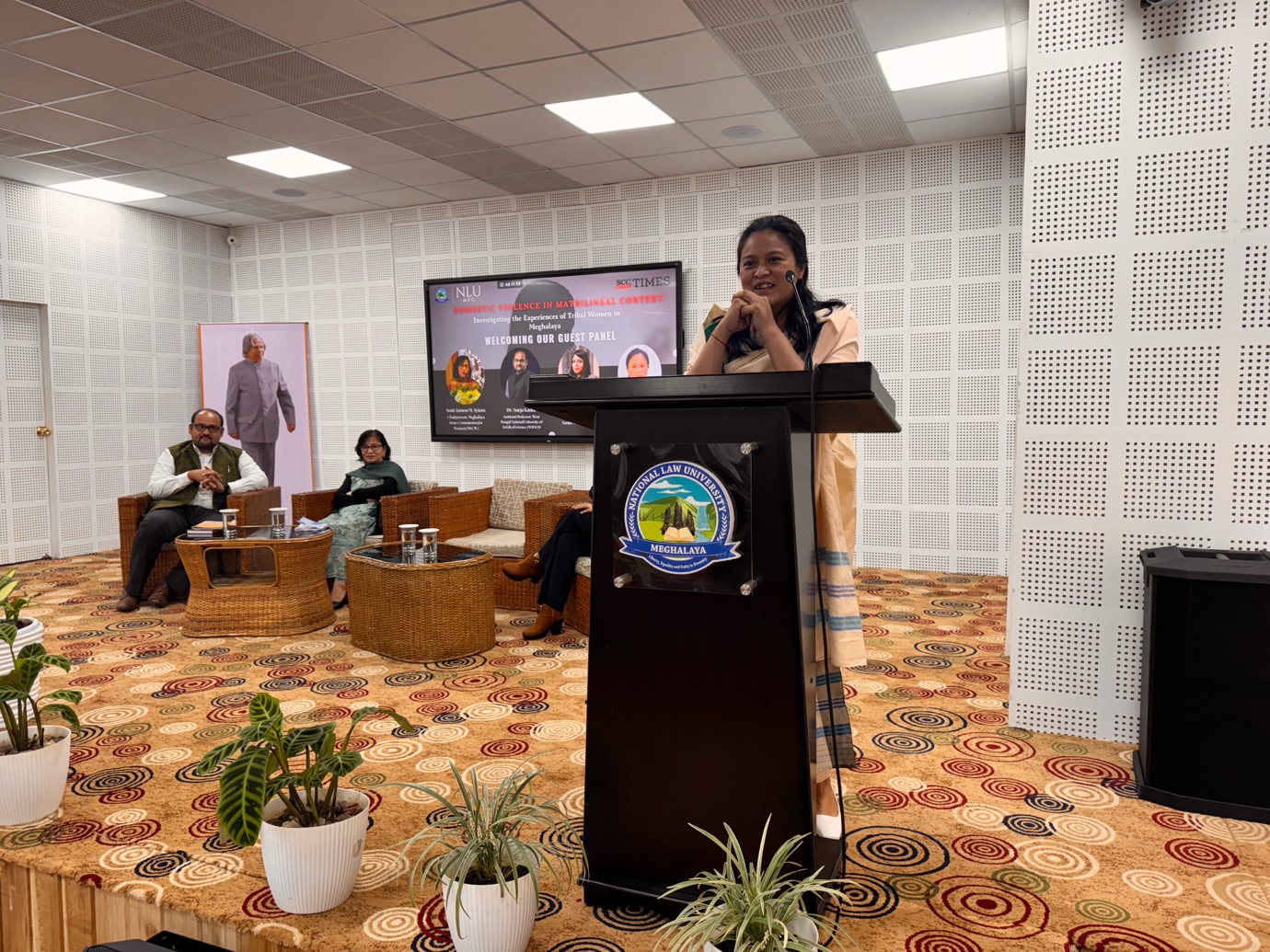
Reflective Address by Smti. Iamonlang M. Syiem
Smti. Iamonlang M. Syiem presented a deeply insightful and reflective talk on the complexities surrounding matrilineal societies, kinship structures, and the underlying social and cultural factors that influenced violence. Opening with a candid admission of her initial misunderstanding of the panel format, she emphasized the value of the diverse perspectives gathered and hoped participants took away meaningful insights.
She distinguished between patriarchy and matriliny, clarifying that while patriarchal systems vested descent, property, and decision-making in paternal males, matrilineal societies traced these through females and maternal males. This nuanced understanding framed her exploration of the Northeast’s unique social fabric.
She elaborated on kinship as a “secret domain” governed by intricate social norms, obligations, and expectations that regulated family life. Despite modernization, urbanization, and changing religious practices, traditional roles such as maternal uncles managing property remained significant. Yet, she noted that shifts in migration and cultural influences were eroding these social controls, contributing to instability and violence.
The address touched on linguistic and cultural practices that subtly perpetuated gender inequalities and violence, underscoring how embedded language and socialization shaped perceptions of men’s superiority and women’s roles. Warning of the erosion of social cohesion, she challenged listeners to critically examine these inherited values while acknowledging the economic realities and social protections tied to marriage.
She called for compassion and self-reflection, urging students and future legal practitioners to approach these issues with empathy and honesty to effect genuine change. She underscored the importance of understanding personal biases and societal constructs to navigate the complex dynamics of relationships and violence.
Her thoughtful discourse culminated by confronting the pervasive culture of violence, amplified through media and social messaging, urging the audience to establish internal boundaries against such negativity. She challenged all to engage deeply with themselves and their communities to foster meaningful transformation. This profound address wove cultural anthropology with social justice, enriching the seminar’s dialogue with critical reflections on identity, tradition, and the pursuit of justice in matrilineal contexts.
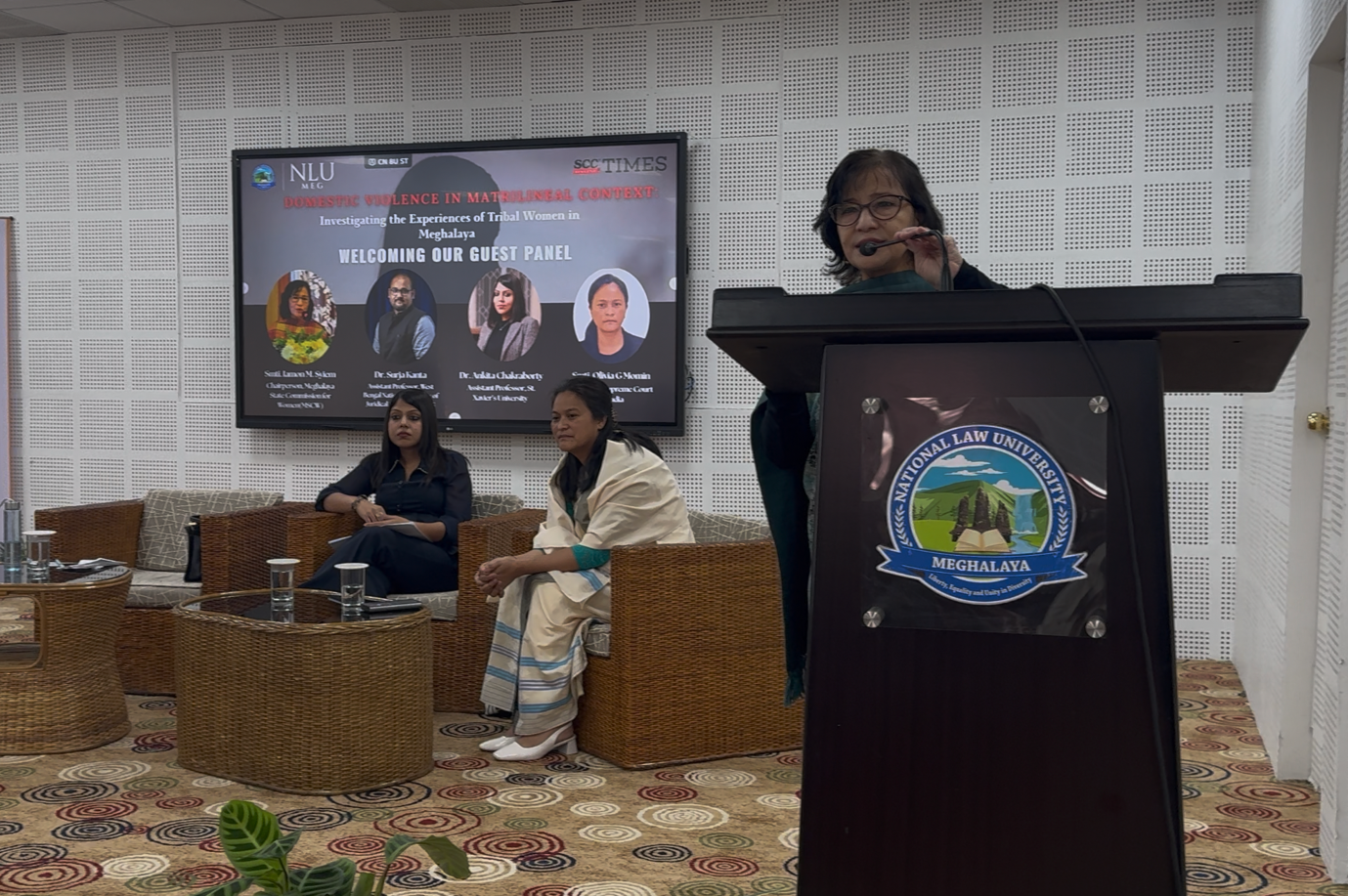
Question and Answer, and Audience Interaction
The seminar concluded with an engaging and thought-provoking Question and Answer session, where participants actively contributed their questions and reflections inspired by the day’s rich discussions. The exchange highlighted the complexities of addressing domestic violence within the matrilineal context of Meghalaya, underscoring the interplay between cultural norms, legal frameworks, and social realities.
Speakers and panellists provided candid insights, emphasising the urgent need for increased awareness, empathy, and pragmatic solutions that honoured both tradition and the rights of survivors. This interactive dialogue reaffirmed the collective commitment of academics, activists, students, and community members to foster justice, support victims, and catalyse meaningful change. Attendees left with a deeper understanding and renewed motivation to advance the cause against domestic violence in all its forms.
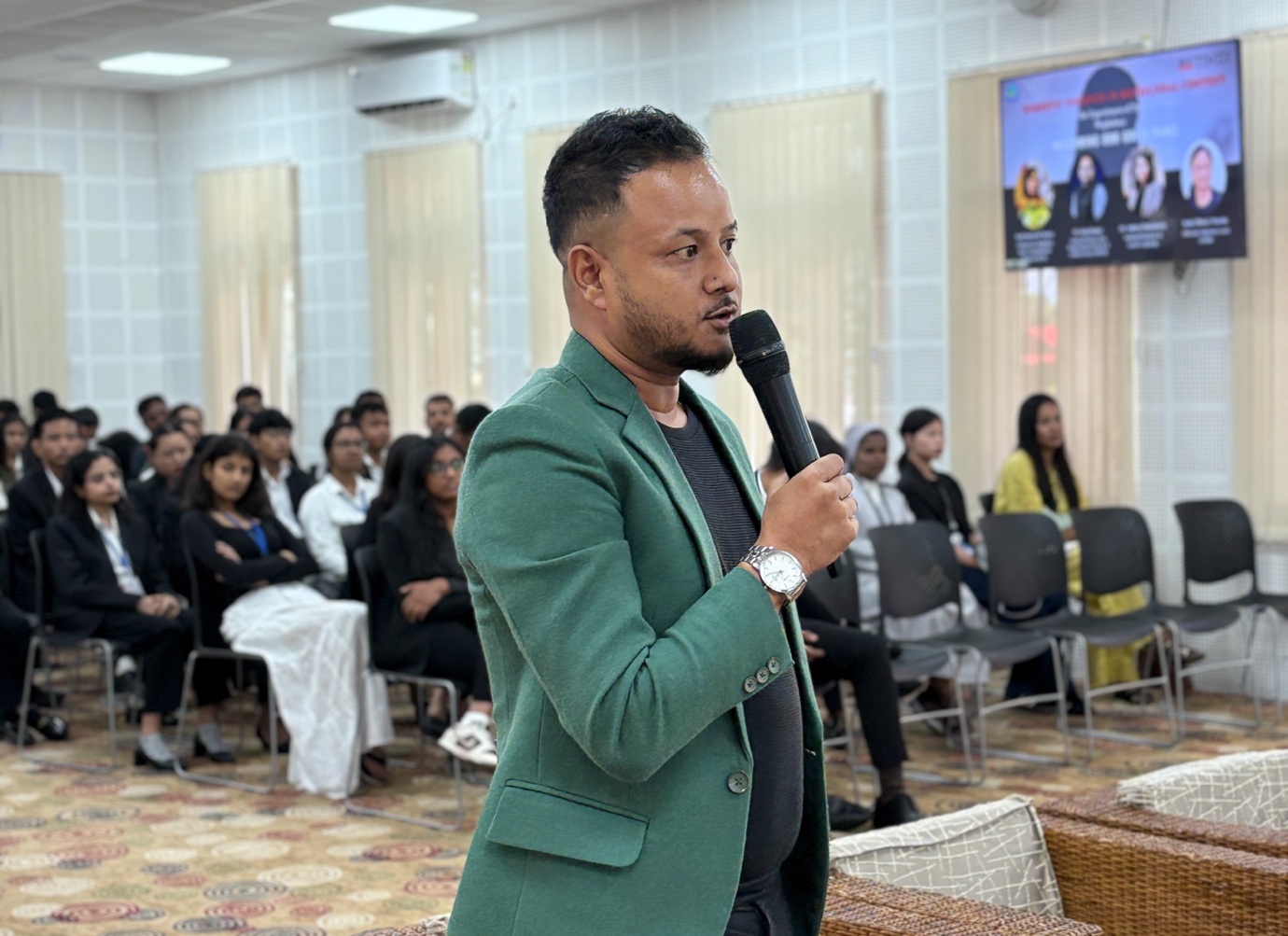
Closing and Vote of Thanks
Professor Dr. Umeshwari Dkhar, Assistant Professor and Coordinator of Legal Aid Society, NLUMEG, delivered the valedictory address, urging reflection on cultural inheritance, kinship, and the pursuit of justice. She highlighted the importance of student-driven outreach and empathetic advocacy.
The seminar concluded with the Vote of Thanks delivered by the President of the Legal Aid Society, NLU Meghalaya. She warmly expressed her gratitude to the eminent speakers for their insightful deliberations on domestic violence within the matrilineal context of Meghalaya. She also acknowledged the constant support of the University administration, the guidance of faculty members, and the hard work of the organising team. Extending thanks to the participants and students, she emphasised that their active involvement enriched the discussions. She reaffirmed the commitment of the Legal Aid Society towards creating awareness and addressing issues of social justice through future initiatives.


